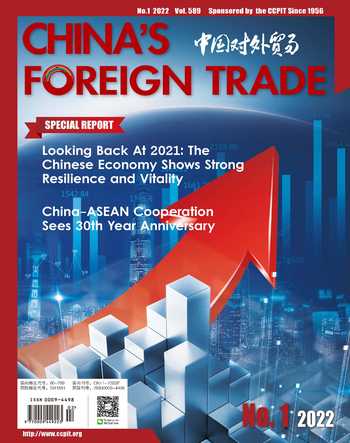Innovative Power Generated by the Digital Economy
By Audrey Guo
In recent years, with the vigor- ous demand of intelligence and information in all walks of life, the digital economy has become an important engine to promote the high-quality development of China’s economy. The sudden outbreak of COVID-19 in 2020 brought a huge blow to the global economic market, and had a great impact on the development of global trade and consumer employment, but at the same time, it also brought historic development opportunities to China’s industrial digital transformation. As the only economy in the world that has continued to grow since the outbreak, the steady growth and soft landing of China’s economy is mainly due to the rapid development of the digital economy.
The increasing importance of digital economy
On October 18, 2021, in the thirty-fourth group study session of the Political Bureau of the CPC Central Committee, General Secretary Xi Jinping emphasized that in recent years, technologies such as the Internet, big data, cloud computing, artificial intelligence and blockchain have accelerated innovation, and are increasingly integrated into the process of economic and social development in all fields. With its rapid development, wide radiation range and unprece- dented influence, the digital economy is becoming a key force to reorganize global resources, reshape global economic structure and change global competition pattern.
The outline of the 14th FiveYear Plan (2021–2025) for national, economic and social development, as well as the vision of the of the People’s Republic of China for 2035 directly stated “An Initiative to Build a Digital China”. And “digitalization” appeared 25 times in the outline as a keyword, while data as a keyword appeared 53 times. Compared with the previous Five-Year Plan, digital construction grows more strategic, and the importance of the digital economy’s role in national economic and social development is becoming more and more obvious. The digital economy is becoming the growth pole to promote the high-quality development of China’s economy.
China’s huge and rapidly growing number of enterprises created a broad market for digital services. According to data disclosed by the National Bureau of Statistics, as of the first half of 2021, the number of corporate units in China exceeded 30 million for the first time, four times that of 7.73 million in 2011, and the annual growth rate of corporate units in the past five years has remained above 16%. The growth of newly-added enterprises not only enhances the kinetic energy of China’s economic innovation, but also provides ample broad market for the development of digital industry segments such as enterprise services.
In the post-pandemic era, enterprises’ showed increased willingness to partake in a digital transformation, and the IT expenditure of Chinese enterprises continues to grow. The sudden outbreak of COVID-19 directly stimulated the digital transformation of government departments and traditional enterprises. During the pandemic, new digital business modes such as flexible office, online education, teleconferencing, live e-commerce and unmanned chemical plants meant there were many new digital needs. At the same time, the pandemic also promoted the accelerated construction of digital infra- structure, the iterative upgrade of new technologies and tools at the bottom, and enhanced the empowerment of digital service providers. The pandemic was a vivid digital training course and an accelerator of enterprise’s digital transformation.
According to Gartner, China’s IT expenditure was expected to reach RMB 3.09 trillion in 2021, an increase of 7.7% compared with 2020. Among them, the growth rate of IT services, equipment and application software expenditure will keep up their high growth. Digitalization has been a mainstream technology trend for the past two years, and the fields of cloud computing, core business applications, security and customer experience are at the forefront of this trend. With the expansion and improvement of telecommuting environment, the software expenditure of Chinese enterprises will still maintain a high growth rate in 2022, with the growth rate expected to reach 13.4%.
The Outline of the 14th FiveYear Plan states greater integration of digital technology and the real economy, and deep integration is the general trend. At present, the penetration of the real economy in various industries shows that the penetration rate of the digital economy in the tertiary industry is relatively high, while that of the primary and secondary industries is relatively low. According to the data of the China Academy of Information and Communications Technology, in 2020, the penetration rates of China’s digital economy in service industry, industry and agriculture industry was 40.7%, 21.0% and 8.9% respectively, and there will be huge market opportunities for the integration and development of traditional industries such as industry and agriculture with low penetration rate and emerging technologies.
Intelligent manufacturing industry gains market attention
The 2021 China Digital Panorama and Innovative Enterprises Research Report (hereinafter the Report) released by Cyzone Research Center pointed out that new infrastructure is constantly emerging, and technologies such as cloud computing, big data, artificial intelligence and the Internet of Things are continually iterative and grow mature, and digital technologies empower enterprises in many links such as production and supply, business development, marketing management and strategic decision-making. The vigorous demand of enterprise digital transformation and upgrading drives the digital venture capital market to develop steadily in the winter.
In recent years, promising new companies in the digital field have become important targets for investment institutions. According to data from the analysis of Cyzone Bangrui, up to November 30, 2021, the number of investment and financing cases in China’s digital field reached 5,336, an increase of 3% compared with the whole year of 2020. From 2016 to November 30, 2021, the proportion of domestic digital economy financing in the whole industry increased year by year, from 37% in 2016 to 53% in 2021. Among them, enterprise services, intelligent manufacturing and artificial intelligence have become the popular financing tracks in the primary equity market of digital economy.

The Report shows that as an important field of digital core driving force, digital enterprise services represented by cloud computing still occupy an important position in the digital track in recent years. According to the data analyzed by the Cyzone Bangrui,in the first 11 months of 2021, there were 1,442 financing cases for domestic enterprises, accounting for 14.4% of the total financing cases in the whole industry, which was slightly higher than the 1,417 financing cases in 2020.
In recent years, companies focusing on digital enterprise service applications such as those in human resources, fiscal and tax expense control, sales management and other fields have frequently received large amounts of financing. In October 2021, Huice won an investment of USD 312 million from Softbank Vision Fund, Hillhouse Venture, Legend Capital, and others. Huice continued to focus on retail intelligence, strengthen the network synergy effect of domestic e-commerce, improve data intelligence, strengthen the integration of the whole process of cross-border business, and create an excellent SaaS product system intelligent manufacturing as a key area of digital technology and industry integration. In recent years, the number of investment and financing has increased significantly, indicating that the market is optimistic about the track.
In April, 2021, the 14th Five-Year Plan for Development on Smart Manufacturing issued by the Ministry of Industry and Information Technology defined the path and goal of intelligent manufacturing development. In 2025, manufacturing enterprises above designated size will basically popularize digitalization, and key enterprises in key industries will initially realize intelligent transformation. In 2035, manufacturing enterprises above designated size will be fully digitized, and key enterprises will basically realize intelligent transformation. The Ministry of Industry and Information Technology also proposed that in 2025, the technical level and market competitiveness of intelligent manufacturing equipment and industrial software will be significantly improved, the domestic market satisfaction rate will exceed 70% and 50% respectively, and a number of innovative carriers and public service platforms in the field of intelligent manufacturing will be built, providing more solid foundation support.
The implementation of favorable national policies and broad market demand are promoting the rapid development of smart manufacturing, and the investment institutions and industrial institutions in the primary market are speeding up. According to the data of the Cyzone Bangrui, the financing data of the smart manufacturing track continued to rise from 2019. By November 30, 2021, the number of domestic smart manufacturing financing had reached 1,359, accounting for 13.6% of the total industry financing, and the number of investment and financing cases had increased by 22.54% compared with 2020.
In 2021, some key enterprises of the smart manufacturing track received high financing. In November of 2021, Xiaomi Technology added an investment of USD 70 million from?Hesai Technology, which was mainly used to support the construction of Hesai Maxwell Intelligent Manufacturing Center and the research and development of high-performance laser radar chips with vehicle specifications. In October, 2021, GP Capital and other industrial investment institutions invested RMB 1 billion in Jiangsu Silicon Integrity Semiconductor Technology Co., LTD(JSSI), a semiconductor packaging tester. In the future, JSSI will lay out in a higher technology field, increase investment in packaging and testing equipment and expand production capacity, so as to obtain a broader market and innovation space, and meet more customer needs.
Beijing, Shanghai and Guangzhou: hot spots for digital industry investment and financing
According to the Report, relying on their strong economic foundation and abundant innovative resources, cities such as Beijing, Shanghai and Guangzhou are among the best for investment and financing in the digital technology field represented by enterprise services, artificial intelligence and big data, and for investment and financing in the digital application field represented by intelligent manufacturing, medical digitalization and smart cars.
According to the data by Cyzone Bangrui, from 2018 to November 2021, in the field of enterprise services, Beijing ranked first with 1,703 financing cases, followed by 1,119 in Shanghai and 620 in Shenzhen. In the field of artificial intelligence and big data, the number of investment and financing cases in Beijing, Shanghai and Shenzhen is also in the forefront.
It is worth noting that in the digital application field, Suzhou, Nanjing and other cities in the Yangtze River Delta region, Chengdu and Chongqing, and Wuhan in the middle reaches of the Yangtze River show a strong development trend. Relevant statistics of local governments show that the total economic output and industrial added value of the Yangtze River Delta region account for about a quarter of the country’s total, with a strong industrial base, which is the main battlefield for promoting the stable development, transformation and upgrading of manufacturing industry. Chengdu-Chongqing region is an important manufacturing part in western China. From January to September 2021, the manufacturing revenue of Sichuan and Chongqing reached RMB 5.6 trillion, up by 18.5% year-on-year, including RMB 3.7 trillion in Sichuan and RMB 1.9 trillion in Chongqing. The market demand of manufacturing transformation and upgrading in second-tier cities provides a broad market for the integration of digital technology and real economy.
- China’s foreign Trade的其它文章
- Looking Back At 2021:The Chinese Economy Shows Strong Resilience and Vitality
- CCPIT Work Meeting 2021 Is Held Virtually in Beijing
- Joint Effort to Resolve Disputes in Intellectual Property Rights
- Six Industry Opportunities As A Result of Population Change
- Demands for Coal-fired Power Will Reach New High
- IDC’s Top 10 Predictions on China’s ICT Market In 2022

